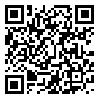Volume 3, Issue 3 (Oct-Dec 2014)
JCHR 2014, 3(3): 185-94 |
Back to browse issues page
Mohammad Hossien Salmani Nodoushan 
 , Zahra Soltanian Zadeh *
, Zahra Soltanian Zadeh * 
 1, Taherah Jasemi Zad
1, Taherah Jasemi Zad 
 , Parvaneh Talebi
, Parvaneh Talebi 
 , Maryam Kafash Panah
, Maryam Kafash Panah 
 , Najmeh Dehghani
, Najmeh Dehghani 
 , Jalal Nikukaran
, Jalal Nikukaran 


 , Zahra Soltanian Zadeh *
, Zahra Soltanian Zadeh * 
 1, Taherah Jasemi Zad
1, Taherah Jasemi Zad 
 , Parvaneh Talebi
, Parvaneh Talebi 
 , Maryam Kafash Panah
, Maryam Kafash Panah 
 , Najmeh Dehghani
, Najmeh Dehghani 
 , Jalal Nikukaran
, Jalal Nikukaran 

1- , Z_soltanian@yahoo.com
Abstract: (4391 Views)
Introduction: Nickel is found in varies industrial processes such as electroplating, leather tanning, cement preservations, paints and pigments, textile, steel fabrication and canning industries. It is proved that Ni(II) has several health hazards such as carcinogenic. The aim of this study was the evaluation of Ni(II)adsorption on Apple peel granola from aqueous solution.
Material and Methods: This study was done in laboratory scale and batch condition. In this study, the effects adsorbent dose, contact time and pH were investigated on the removal of nickel by batch process. The Apple peels granola prepared in lab conditions, and sieved by standard sieves of 60-100 mesh. The nickel concentration in standard and unknown samples was measured by AA spectrophotometer. For understanding of the adsorption process, the experimental data were analyzed with some isotherm and kinetic models.
Results: The maximum removal at was found in pH= 7. The nickel removal efficiency decreased from 50.1 to 25% by increasing adsorbent dosage. By increasing of pH from 3 to 7, the removal efficiency increased from 19.8% to 35.0% at 30 min contact time. The adsorption isotherm and Kinetic analysis of our results showed that the results well fitted by the Frundlich isotherm model (R2= 0.909) and pseudo-first-order kinetic model (R2= 0.926).
Conclusion: the results showed that Apple peel granola is able to absorb the nickel from aqueous solutions and removal efficiency was more in pH=7. Preparing of Apple peel granola adsorbent is simple, cheap and its application is in priority because of its porous structure in comparison with other natural adsorbents.
Material and Methods: This study was done in laboratory scale and batch condition. In this study, the effects adsorbent dose, contact time and pH were investigated on the removal of nickel by batch process. The Apple peels granola prepared in lab conditions, and sieved by standard sieves of 60-100 mesh. The nickel concentration in standard and unknown samples was measured by AA spectrophotometer. For understanding of the adsorption process, the experimental data were analyzed with some isotherm and kinetic models.
Results: The maximum removal at was found in pH= 7. The nickel removal efficiency decreased from 50.1 to 25% by increasing adsorbent dosage. By increasing of pH from 3 to 7, the removal efficiency increased from 19.8% to 35.0% at 30 min contact time. The adsorption isotherm and Kinetic analysis of our results showed that the results well fitted by the Frundlich isotherm model (R2= 0.909) and pseudo-first-order kinetic model (R2= 0.926).
Conclusion: the results showed that Apple peel granola is able to absorb the nickel from aqueous solutions and removal efficiency was more in pH=7. Preparing of Apple peel granola adsorbent is simple, cheap and its application is in priority because of its porous structure in comparison with other natural adsorbents.
Review: Research |
Subject:
General
Received: 2014/11/18 | Accepted: 2014/11/18 | Published: 2014/11/18
Received: 2014/11/18 | Accepted: 2014/11/18 | Published: 2014/11/18
| Rights and permissions | |
 |
This work is licensed under a Creative Commons Attribution 4.0 International License. |
